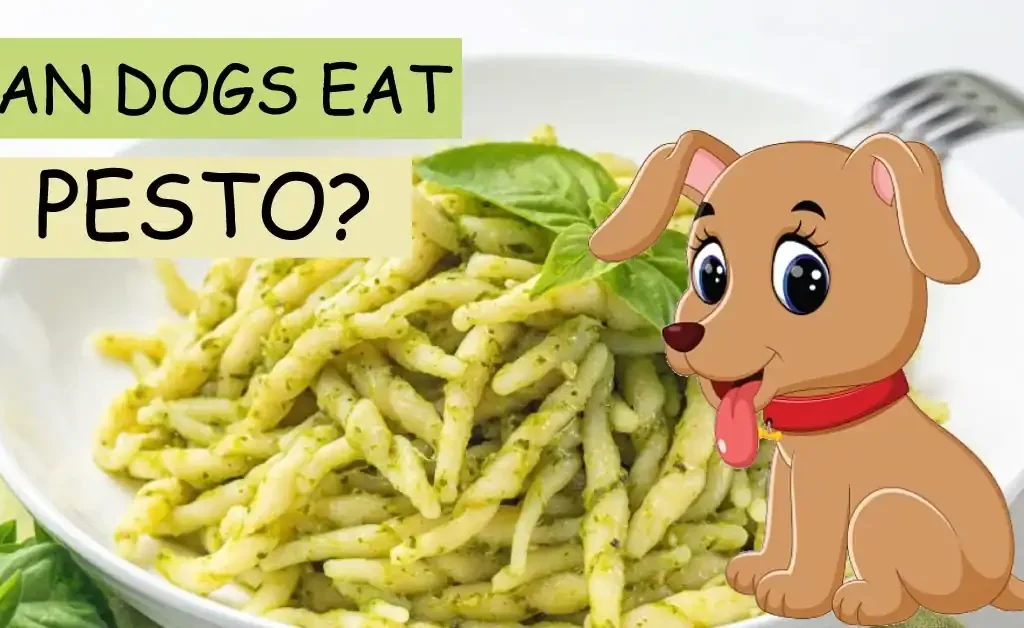Can dogs eat Vienna sausages? Dog owners are naturally concerned about the safety and compatibility of various human foods for their canine companions. Vienna sausages are one such delicacy that frequently makes its way into pantries.
These little canned sausages are convenient and delectable for humans, but are they safe for dogs? How do they affect their digestive system? We’ll go into the matter regarding feeding Vienna sausages to your canine companion.
Can My Dog Eat Chicken Vienna Sausage?
Vienna sausages are not usually advised as a regular part of a dog’s diet because they are heavy in sodium, preservatives, and artificial flavors. If you have decided to feed your dog chicken Vienna sausages, make sure you do it in moderation and with caution.
Vienna sausages are high in calories and fat. Therefore, always select sausages with less fat content and harmful fillers to prevent unwanted health risks in dogs.
Although chicken Vienna sausages are an excellent source of protein for dogs, they should not be used in place of a balanced and nutritious diet. You should also carefully examine the label to ensure no dangerous substances or additives in the sausages, such as onions, garlic, or excessive salt.
Furthermore, observing your dog’s reaction is critical while introducing any new food, even chicken Vienna sausages. Certain substances may cause gastric distress, vomiting, diarrhea, or other undesirable reactions in certain dogs who are allergic or sensitive to them.
Can dogs eat chicken Vienna sausages? Consult your veterinarian before giving chicken Vienna sausages to your dog if you are unsure or if your dog is facing any underlying health concerns or dietary restrictions. Your veterinarian can guide you on the optimal nutrition for your dog, including protein sources, quantities, and potential dangers connected with various foods.
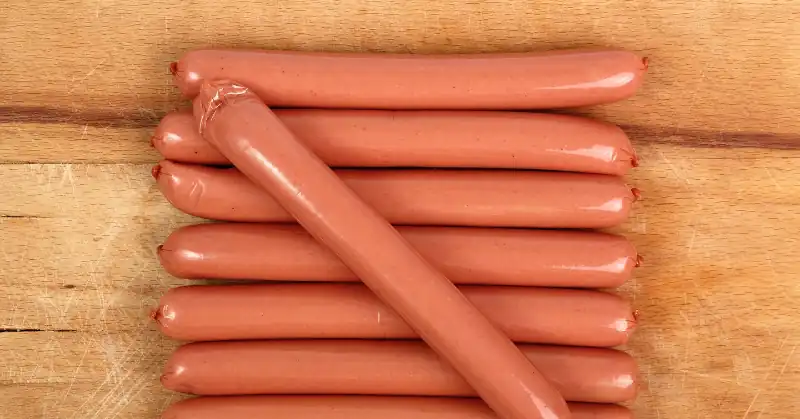
6 Potential Risks of Feeding Vienna Sausages to Your Dog
Vienna sausages are unlikely to cause death in dogs when ingested in moderation and as an occasional treat. However, they entail some hazards that, if not appropriately controlled, could lead to serious health problems. Can Vienna sausages kill dogs? To keep your dog safe, understand these hazards and take precautions.
1. High Sodium Level
The high sodium level of Vienna sausages is one of the key concerns. These sausages are frequently preserved with salt, which can harm dogs, particularly those with underlying health issues like heart disease or kidney disease. Excess sodium consumption in dogs can cause dehydration and possibly salt toxicity.
2. Preservatives
Vienna sausages frequently contain chemicals and preservatives such as nitrates and nitrites, which enhance flavor and increase shelf life. These substances are potentially toxic to dogs, causing digestive discomfort or allergic reactions.
3. Synthetic
Can my dog eat Vienna sausages? Processed meats, particularly Vienna sausages, have been linked to an elevated risk of specific health problems in humans, including cardiovascular disease and certain types of cancer. While the direct influence of processed meats on dogs is not well studied, it is generally recommended that their consumption be limited to preserve overall health.
4. Choking Hazard
Vienna sausages are often compact and cylindrical, which might constitute a choking threat for dogs, particularly smaller breeds or those who gulp their food without chewing thoroughly. Ingesting large portions without chewing correctly can result in choking or intestinal blockage.
5. Nutritional Imbalances
Feeding Vienna sausages as a significant component of a dog’s diet can result in nutritional imbalances. Dogs require a well-balanced diet rich in high-quality protein sources and adequate carbs, lipids, vitamins, and minerals. Using processed meats like Vienna sausages might deprive dogs of vital nutrients for optimal health.
6. Allergic Reactions
Dogs may develop some uncertain reactions when given Vienna sausages. They may incorporate fake additives or spices to enhance the taste. A high content of sodium nitrate and phosphates majorly affects the dog’s digestive system and may prompt multiple allergic responses.
Can a dog eat Vienna sausages without death risks? While tiny amounts of Vienna sausages may not result in death right away. Maintain your dog’s general health and well-being by giving a nutritionally balanced diet of high-quality dog food and appropriate treats. If you have any concerns regarding your dog’s diet or reaction to a particular food, you should always consult your veterinarian for personalized advice and guidance.
How Can You Vienna Sausages?
Vienna sausages are processed meat products made from beef, pork, and fowl. They are pre-cooked, smoked, and then canned, making them shelf-stable and ready to eat without further preparation. These sausages are frequently seasoned with spices and flavorings, giving them a distinct flavor many enjoy.
Can I feed my dog with Vienna sausages of any kind? Vienna sausages are distinguished by their size and shape. They are typically small, cylindrical sausages measuring 3 to 4 inches long and 1 inch in diameter. The sausages are frequently seasoned with spices like garlic, paprika, and pepper to enhance the flavor.

How Do Vienna Sausages Please Your Dog?
While Vienna sausages may be appealing to share with your dog, it’s crucial to remember that the hazards linked with these processed meat products often exceed the advantages. Can dogs eat Vienna sausages daily? Vienna sausages are not generally recommended for a dog’s daily diet. However, there are a few potential benefits if given in moderation and with caution
1. Protein Source
Because Vienna sausages are mostly made of meat, they are a good protein source for dogs. Protein is required for muscle growth, tissue repair, and overall health. However, other, better protein sources for dogs, such as lean meats and high-quality food tailored to satisfy their nutritional needs, are available.
2. High Palatability
Due to their rich flavors and seasonings, Vienna sausages are frequently particularly appealing to dogs. This can make them appealing as a treat or for use during training sessions. However, these sausages’ nutritional value and hazards must be considered.
3. Variety and Enrichment
Introducing new textures and flavors to your dog’s diet can help stimulate and enrich his mind. As a reward, a tiny amount of Vienna sausages can give variety to their taste experiences, preventing monotony in their everyday meals.
4. Appetite Stimulant
Due to their rich flavors, Vienna sausages may be more enticing to dogs with a diminished appetite or during illness. A tiny amount of Vienna sausages can assist in enticing a dog to eat when they are otherwise unwilling.
Are Vienna sausages good for dogs? Remember that while these possible advantages exist, they must be balanced against the hazards connected with Vienna sausages. Prioritize a well-balanced and healthy diet for your dog, focusing on high-quality dog food and treats specifically developed for their nutritional needs.
Preparing Vienna Sausages at Home | A Quick Guide!
Can dogs have Vienna sausages with herbs? Preparing Vienna sausages at home for your dog is a safer alternative to store-bought kinds since you have complete control over the contents. Follow this quick and easy recipe for homemade Vienna sausages for your canine companion:
Ingredients
- Lean ground beef or a lean meat mixture (such as beef, pig, or chicken)
- Low-sodium broth or water
- Optional: Herbs or spices safe for dogs (contact your doctor for recommendations).
- Optional: Vegetables (like carrots or peas) for extra nutrients
Instructions
- To reduce fat content, choose lean cuts of meat. Avoid processed meats and meats with bones, skin, or extra fat.
- Use a meat grinder to grind or mince whole portions of meat. Alternatively, you can buy ground meat from a reputable supplier.
- In a mixing bowl, combine it with a small amount of water or low-sodium broth—the liquid aids in binding the substances. Add any optional herbs or spices recommended by your veterinarian for extra flavor.
- Finely chop or puree dog-friendly vegetables like carrots or peas if preferred. These can boost the nutritional value and fiber content of the sausages. Combine the vegetables with the meat.
- Form small amounts of the meat mixture into sausage-like cylinders. You can shape them with your hands, sausage casings, or clean, food-grade plastic wrap. Maintain a size appropriate for your dog’s breed and chewing tendencies.
Cooking Ways
There are several cooking ways to choose from:
- Place the sausages in a steamer basket and steam for 10-15 minutes or until thoroughly cooked.
- Preheat the oven to a medium temperature (about 350°F or 180°C). Place sausages on a baking sheet with parchment paper. Bake for 20-25 minutes or until thoroughly done. To ensure even browning, flip them halfway through the cooking time.
- Heat a small amount of dog-safe oil (such as coconut or olive oil) in a nonstick skillet over medium heat. Cook the sausages for 10-15 minutes, regularly rotating, until browned and cooked.
- You allow the sausages to cool completely before offering them to your dog. Keep leftovers in an airtight jar and freeze them for extended periods.
- Though such homemade sausages are healthy and safe for our furry friends, it is essential to give them high-quality dog supplements to maintain a balanced diet. Choose organic and natural dog treats as per the vet’s recommendations. Such keen decisions will keep your pet sound and active at the same time.
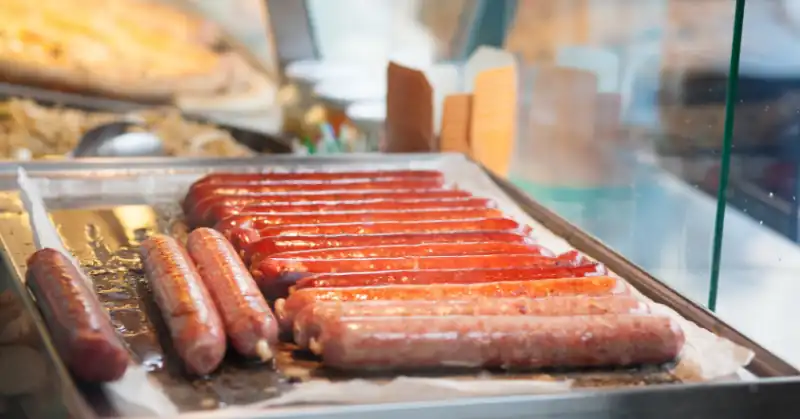
You may also like reading: Best Homemade Dog Food Recipes for Kidney Disease
6 Safety Tips for Giving Vienna Sausages to Your Dog?
You must cautiously feed Vienna sausages to your dog due to the potential dangers of this processed meat product. To feed your dog a small quantity of Vienna sausages as a treat, follow these guidelines:
1. Read the Ingredients
Before purchasing Vienna sausages, read the ingredients list thoroughly. Look for sausages with as little additives, preservatives, and seasonings as possible. Avoid substances known to be toxic to dogs, such as onion or garlic powder.
2. Consult a Veterinary Surgeon
Before adding new food to your dog’s diet, consult your veterinarian. They can give personalized advice based on your dog’s health and dietary demands.
3. Select Appropriate Portions
Vienna sausages should be fed to your dog in little, bite-sized portions. Consider your dog’s size and modify the part accordingly. To avoid choking or stomach disorders, it’s best to prevent caution and provide smaller servings. Cut the Vienna sausage into small, manageable pieces before serving. Giving your dog a whole sausage increases the risk of choking.
4. Cooked or Uncooked
Vienna sausages are pre-cooked and can be eaten without further preparation. If you want to prepare them, ensure they are fully heated to kill bacteria or parasites that could hurt your dog.
5. Introduce Gradually
When introducing Vienna sausages, start with a modest amount to see how your dog reacts. Watch for signs of stomach problems or allergic reactions, such as vomiting, diarrhea, or skin rashes. If any negative reactions occur, stop feeding Vienna sausages right away.
6. Keep Your Dog Hydrated
Due to their high salt level, Vienna sausages can cause your dog to become thirsty. After consuming salty food, ensure your dog can access fresh water to stay hydrated.
While Vienna sausages may be tempting to share with your canine companion, it is critical to be concerned about their health and well-being. Can dogs eat Vienna sausages at home? Always seek advice from your veterinarian on appropriate treats and feeding practices for your unique dog.
Vet’s Approved Vienna Sausages Alternatives
As Vienna sausages are rich in salt content and pose multiple health risks to our canine companions, vets suggested other healthy alternatives. It is essential to prioritize your pets’ health rather than giving them your favorite food items. Let us discuss some safe and healthy alternatives for Vienna sausages.
1. Lean Meat
Lean meat such as boiled chicken, turkey, or beef is one of the best and sound alternatives for Vienna sausages. Remove all the excess fats and spices if added to reduce the risk of uncertain reactions.
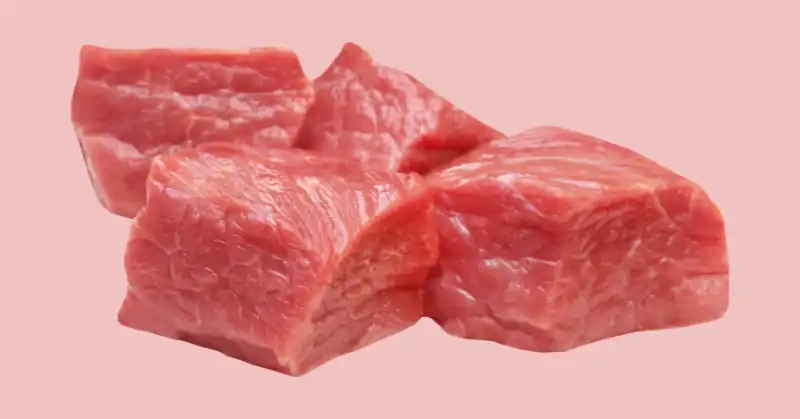
2. Natural Diet
Nature never harms its surroundings. Try to keep your pet’s diet as natural as it could be. Serve fresh veggies and fruits as per their nutritional demands. Get a vet’s guide before adding any citrus fruit, especially to your dog’s eating regimen.
3. Commercial Dog Food
Commercial or vet’s approved dog food brands are much safer options than giving them Vienna sausages. Those branded foods are made specifically for canines as per their nutritional needs and sensitive immune systems. Moreover, they don’t have unhealthy additives or sweeteners that could harm our pet’s digestive system
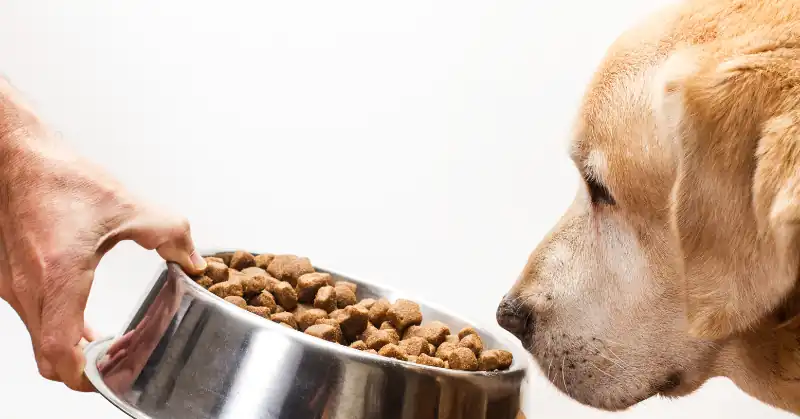
4. Homemade Food
You can also prepare dog food at home, getting help from a vet’s approved dog food recipe. Making dog food at home can reduce risks of unhealthy content addition, done either intentionally or not. Make a healthy, less seasoned treat for your pet under a vet’s guidance.

5. Dental Chews
Commercial dental chew treats are another best and most joyful alternative to boring Vienna sausages for dogs. These dental chews not only please our pets’ mental status but also give fruitful advantages to their oral health.
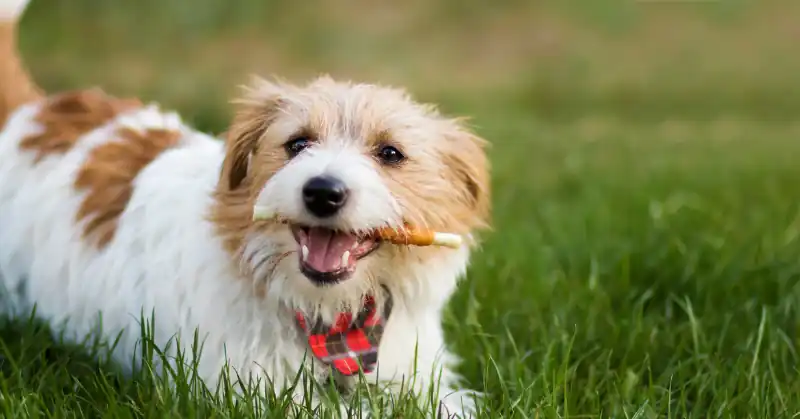
Remember, it is crucial to seek a vet’s guidance before adding any new diet to your pet’s eating regimen. If you are unable to reach a vet’s clinic, there are plenty of online forums and pet owners’ communities where they discuss dog diets. You may get a sound dietary plan from such forums.
Last Note
Pet owners wonder, “Can dogs eat Vienna sausages?” Do they benefit or boost dogs’ normal physiology? Vienna sausages, although processed meat, can help your pet in terms of a protein source. Moderation is necessary to keep your dogs’ health sustainable. We had a detailed discussion on the benefits, risks, preparation of healthy Vienna sausages at home, and more. Give a read for a better understanding.
Frequently Asked Questions (FAQs)
Q: Can a dog eat Vienna sausages in the morning?
A: Dogs can eat them anytime as a healthy supplement to their diet. It is essential to serve in moderation, as it is high in sodium content that can harm your dog’s health.
Q: Where can I buy Vienna sausages for my dog?
A: You can get them from supermarkets or departmental grocery stores. They are generally found in the canned section.
Q: Can I give Vienna sausages with milk to my puppy?
A: You must ask the specialist for this combo. Some dogs are lactose intolerant, so add milk gradually to your puppy’s diet and seek reactions.




